In the last three months it has become crystal clear that, among other matters, the COVID-19 pandemic in Hungary has taken its toll on a peculiar subject – the rule of law itself.

Even though democratic backsliding in Hungary has been recognized and described long ago, the steps resulting in the deterioration of the rule of law have been taken cautiously, avoiding direct violation of the positive law in effect. Since 2010, laws have been tailor-made by Prime Minister Viktor Orbán’s two-thirds majority for the needs of the Government. This attitude demonstrated the Government’s ignorance about the idea of the rule of law as a concept that considers legal norms to be boundaries that shall be respected, not unnecessary obstacles which may be easily removed anytime the Government fancies.
Individual institutions have been impaired, checks and balances have been twisted, and a new constitution (the Fundamental Law of Hungary) has even been enacted, but still it has so far been important for the Government to preserve the image that Hungary is a constitutional democracy where the exercise of public power remains within the boundaries set by legal norms.
Something new is yet to come
In the past few weeks it has become apparent that something has changed: the pandemic seems to be the ultimate excuse for the Government to drift towards a new, unusual direction. As is known, on 11 March the Hungarian Government declared a “state of danger”, which is a kind of “special legal order” established in the Fundamental Law. Special legal orders always pose a threat to fundamental rights, as under such circumstances the exercise of those rights may be restricted beyond the general rules set by the Fundamental Law. The state of danger enabled the Government to introduce emergency measures and issue decrees empowered to suspend the application of certain laws or derogate from legal provisions.
In times of peril, special legal orders are suitable legal institutions to provide latitude for taking effective actions, but this latitude is by far not without limits. In line with the constitution, after 15 days these decrees may only remain in force on the basis of an authorization from Parliament. Unfortunately, that required authorization was not used by Parliament, which instead passed the “Enabling Act”, which, timewise, granted unlimited power to the Government to uphold the measures introduced. This was an obvious, open threat to democracy that caused a major international outrage, putting the Government into a difficult position on the European stage, as no epidemiological considerations could justify the reasonableness of such an authorization.
Business as unusual
In terms of communication, the Government found the perfect way to silence critical voices: on 18 June the “state of danger” was terminated and all the special decrees ceased to have effect. Democracy is apparently restored, there is “nothing else to see” here – but as hidden threats are always the most menacing ones, one could not be further from reality if one were to draw the conclusion that all is well. Masked by a lengthy collection of technical legal provisions governing the transition from the “state of danger” back to normality, the existing rules of the “state of medical emergency”, an institution regulated by the Act on Healthcare, have been amended. As a result of this seemingly irrelevant collection of modifications, a new special legal order has been created and declared - but this time it is clearly outside the constitutional framework. The declaration and the duration of this new special legal order depends solely on the discretion of the Government, as the Chief Medical Officer, who may advise the Government to put the mechanism in place, is appointed by the relevant minister and the duration of the state of medical emergency can be prolonged for any length of time after the initial six month period without even the mere theoretical possibility of parliamentary control.
State of medical emergency enables the Government to restrict or ban the operation of “any institution and facility” that could possibly facilitate the spread of the disease. The law defines absolutely no exemptions, which raises several concerns about the functioning of the most vital constitutional institutions. Even if it is hard to imagine how the operation of the Constitutional Court, the judiciary, or the Parliament would pose an epidemiological threat, the lack of safeguards for them is in plain sight. Also, restrictions and bans might be imposed by the Government on exercising the freedom of assembly, and various limitations may be put in place limiting the freedom of movement as well.
These broadly-framed enabling provisions make it possible for the Government to limit fundamental rights by decree, although the Fundamental Law clearly declares that the rules relating to fundamental rights and obligations shall be established by an act of Parliament and exemptions are only tolerated under a special legal order governed by the Fundamental Law itself. A special legal order is special largely as the result of this enhanced room for maneuver when limiting fundamental rights. If a legal institution provides this opportunity, then it is a special legal order regardless of whether it is enshrined in the constitution or not.
Even if this short analysis cannot undertake to review in detail the content of the state of medical emergency, the mere fact that a derogation from the standard of the protection of fundamental rights is possible, contradicting the constitution, demonstrates that the Fundamental Law is not a point of orientation, but just a piece of paper that can be put aside.
According to the constitution, the Constitutional Court is the supreme organ for the protection of the Fundamental Law. Let us hope that the Constitutional Court recognizes that this is the time to act. Until then it is up to the European community to see “through the mask” and recognize that lowering the standard of the rule of law in any European country lowers the European standard itself.
